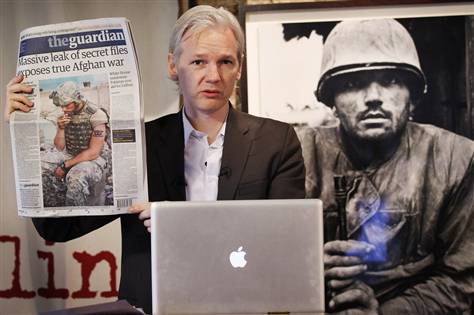
Julian Assange founded the international organization WikiLeaks, where anonymous sources could publish classified governmental information to be leaked to the general public. Assange claims that he created this site because the “public needed to know” about the shady, covert affairs of the government. While this may have been his initial objective, it is obvious that it did not turn out this way. His actions portrayed him as a sort of Internet Robin Hood; however, his intentions ended up not being as pure as the character’s in the fable. Assange ultimately transformed WikiLeaks from an organization for the world community to an organization for himself. Julian Assange’s path to narcissism began in childhood, with his mother’s nomadic lifestyle. By his mid-teens, he had lived in over thirty different Australian towns and attended many different schools. As a result, Assange was unable to form meaningful and long-lasting relationships, causing him to be socially inept. His mother also had several partners, and was eventually supporting Assange on her own. With limited attention from his mother, he reverted to seeking it elsewhere, through a medium of obscurity and isolation. In 1987, Assange started a hacking group called the International Subversives, with whom he hacked the Pentagon, the U.S. Navy, and NASA, among others. In September 1991, Australian Federal Police caught Assange hacking into the Melbourne master terminal of Nortel, a Canadian multinational telecommunications corporation. He was charged with thirty-one counts of hacking and related crimes. It wasn’t until 2006 that Assange, along with a few others, established WikiLeaks. WikiLeaks was an organization created by Assange and others involved in the collection and distribution of secret information and the media by whistleblowers. It is communication as an art form, as it is an electronic dropbox for material that informed the public of issues the government preferred to keep secret. WikiLeaks did not receive global recognition until 2010, when it leaked files such as the Afghanistan and Iraq war logs and 250,000 diplomatic cables. As WikiLeaks became a household name, Assange began to travel around the globe to speak on behalf of his groundbreaking organization. This is where the transition from an “us” company to a “me” company begins. Assange became an enormous public figure, and was widely talked about in the media. Although some perceived him as a terrorist, many considered his work to be noble and beneficial, and he received heavy praised from his followers. All of this admiration started to go to his head, as he declared himself the sole proprietor of the company. With great arrogance, he proclaimed in a press conference, “I am the heart and soul of this organization… its founder, philosopher, spokesperson, original coder, organizer, financier, and all the rest” (1). He openly disregarded the other ingenious hackers, ones such as Daniel Domscheit-Ber, who played an equally important role in building and operating the company. In addition, he failed to recognize the company’s backbone: those who were brave enough to provide the leaks. As his notoriety soared, as did his hubris, which led to an apparent God Complex. He was convinced that he was untouchable, openly discussing his disdain for the law and behaving in an erratic ways. Allegations were brought against Assange for two counts of sexual molestation of two Swedish women, both which he denied. Although they are not proven, we can infer his complicity in the event by him fleeing the country thereby avoiding prosecution. One could directly attribute this to his God Complex, in which he believed he could do anything, including getting away with sexual abuse. Not only did he take credit for his collaborators’ work, but he also avoided responsibility for the actions he did commit. He is still wanted for questioning in Sweden on sexual assault charges. In addition, his primary leaker, Bradley Manning, was sentenced to 35 years in prison for the classified documents he posted to WikiLeaks. Whereas Manning took the full brunt of the disclosure, Assange evaded prosecution because he merely published Manning’s leaks. Assange realized because he only published the leaks, he would not be indicted as a result of a “New York Times problem” related to freedom of the press (2). Assange changed from a Robin Hood type to a power-obsessed Internet tyrant. He started as a vigilante, leaking material in order to keep the public informed. As his public accolades fed his ego, he lost sight of his initial intention of the website, and turned it into a self-promoting vehicle for his own aggrandizement. Sources: 1: http://www.imitatio.org/mimetic-theory/mark-anspach/julian-assanges-double-trouble.html 2: (https://www.washingtonpost.com/world/national-security/julian-assange-unlikely-to-face-us-charges-over-publishing-classified-documents/2013/11/25/dd27decc-55f1-11e3-8304-caf30787c0a9_story.html

